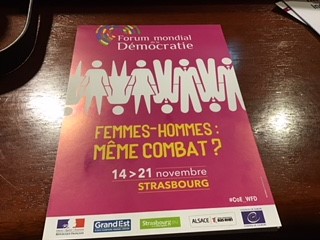Bryony Rudkin
Strasbourg, November 2018
Arriving in Strasbourg on a Sunday evening in November I was surprised to learn the power of the Academie Francaise is not what it used to be, with every shop window declaring both ‘Black Friday” and “le Christmas shopping” alive and kicking. I was there for neither. Instead I was there for the World Forum for Democracy, hosted annually in the city since 2012 by the Council of Europe (C0E), bringing together politicians from all tiers of government, civil society practitioners, academics, media and business representatives. I’m a member of the local government arm of the Council (known as the Congress), nominated by the Local Government Association as part of the UK delegation. The invitation to attend the Forum had interested me as the theme this year was “Gender Equality: Whose Battle?” and the format was that of an academic conference rather than the political bunfights that are my daily fare. The reality was somewhere between the two however…
 Day one was given over mostly to introductory speeches from ministers (France and Spain), the Secretary General of the CoE, regional and local dignitaries and a cultural offer which baffled as much as it entertained. In amongst the usual pleasantries some markers were laid. The Secretary General spoke of how the introduction of gender quotas had changed the culture and behaviour of politics in his native Norway. Personal testimony from a Japanese journalist about rape and violence brought the packed hemicycle to total silence. A Canadian academic spoke of her personal experience of LGBTI, faith and politics. Powerful stuff which set the scene for the debate to come but, in the reaction from some, demonstrated a lack of universal agreement on what issues mattered most and what language to use in explanation and dialogue.
Day one was given over mostly to introductory speeches from ministers (France and Spain), the Secretary General of the CoE, regional and local dignitaries and a cultural offer which baffled as much as it entertained. In amongst the usual pleasantries some markers were laid. The Secretary General spoke of how the introduction of gender quotas had changed the culture and behaviour of politics in his native Norway. Personal testimony from a Japanese journalist about rape and violence brought the packed hemicycle to total silence. A Canadian academic spoke of her personal experience of LGBTI, faith and politics. Powerful stuff which set the scene for the debate to come but, in the reaction from some, demonstrated a lack of universal agreement on what issues mattered most and what language to use in explanation and dialogue.
The following day brought academic presentations and debate in a series of labs. The one in which I was a discussant posed the question “What if she runs? Better representation through higher participation in elections”, with representations from a project in India supporting women in engaging in local decision making and one in Albania seeking to tackle the issue of family voting in rural areas. The level of debate and questioning was rigorous, although not entirely academic in focus, and the breadth of experience on the panel and in the room was refreshing. Twelve labs in total throughout the day showcased a great deal of work and it was a little disappointing there wasn’t more feedback other than a vote on the last day for a democracy innovation award, although everything was webcast so opportunities for catching up later. What was good however was the interaction with presenters and fellow panelists…not least over mispronunciation of our names!
So was it worth it? You bet. Some great discussions and contacts made – a joint German/Israeli project supporting refugees in Berlin, meeting up with an old friend from Prague attending the Forum with fellow political studies students, a British/Polish colleague running an integration project in Italy. Just a few of the connections made. And as for academic dialogue versus political debate? The closing session was enlivened by a protests over the operation of local government in Georgia and demand for a debate on the situation in Ukraine. An apparently infuriated chair reminded the chamber the theme of the Forum was gender equality not national sovereignty. It seems even posing the question is still a work in progress.
 Bryony Rudkin is a PhD student at INLOGOV, Deputy Leader of Ipswich Borough Council and Portfolio Holder for Culture and Leisure. Bryony also works with councils around the country on behalf of the Local Government Association on sector-led improvement, carrying out peer reviews and delivering training and mentoring support.
Bryony Rudkin is a PhD student at INLOGOV, Deputy Leader of Ipswich Borough Council and Portfolio Holder for Culture and Leisure. Bryony also works with councils around the country on behalf of the Local Government Association on sector-led improvement, carrying out peer reviews and delivering training and mentoring support.
All views in this blog are those of the author and not INLOGOV or the University of Birmingham.